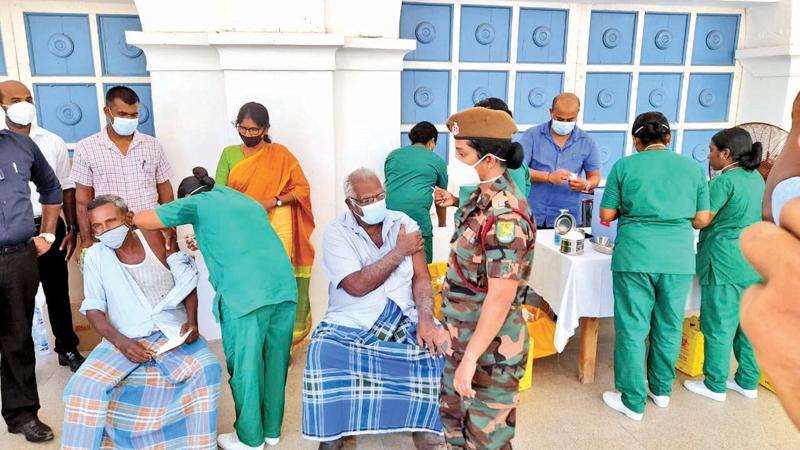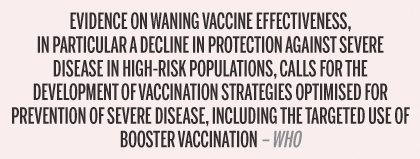
As of February 2, Sri Lanka had 613,478 confirmed cases of Covid-19 with 15,492 deaths, reported to the World Health Organization. With fears of the Omicron variant spreading in the country, the Government has stressed the importance of the booster dose for those who are yet to get it.
According to the Colombo Municipal Council Chief Medical Officer of Health Dr. Ruwan Wijayamuni, the number of Covid-19 fatalities had increased by 4 percent and what stands out is that none of the fatalities since January 1 had received the third dose.
Misconceptions
Health Minister Keheliya Rambukwella expressed concern recently over the misconceptions and hesitancy over the third dose, and stressed the importance of getting it to stay protected from Covid. He said people would be considered ‘fully vaccinated’ if they had received all three doses.
 He said the Government is considering to keep those who aren’t fully vaccinated out of some public spaces such as cinema halls, musical shows and malls, to encourage people to get the third dose. It was also said that hesitancy was not shown in the initial vaccine rollout while those over 60 are those showing reluctance to the third dose.
He said the Government is considering to keep those who aren’t fully vaccinated out of some public spaces such as cinema halls, musical shows and malls, to encourage people to get the third dose. It was also said that hesitancy was not shown in the initial vaccine rollout while those over 60 are those showing reluctance to the third dose.
Covid infections are increasing in Sri Lanka, with 1,238 new infections reported on average each day. According to a News Agency Reuters, this is a 22 percent of the peak — the highest daily average reported on September 4. Sri Lanka has administered at least 35,867,554 doses of Covid vaccines so far. Assuming every person needs 2 doses, thats enough to have vaccinated about 82.3 percent of the country’s population.
Widely available
Even though Sri Lanka has an impressive record of the two doses, administering the booster dose has seen slow progress, mainly due to poor public reception and myths surrounding it.
The Government has made vaccination widely available in health and public locations around the country, including from field clinics conducted by the area’s Medical Officer of Health Office team, main hospitals in the area and walk in clinics conducted by the Tri-forces and Police.
Addressing popular myths about the vaccines, the Ministry of Health said that Covid vaccines do not cause infertility, as some seem to believe.
“This is a rumour related to many different vaccines and there is no truth to this at all. No vaccine currently used causes infertility or lowers fertility in either sex,” a spokesman for the Ministry said.
Also, clarifying that Covid vaccines cannot change our DNA, the Ministry said, “currently there are two mRNA vaccines, and there is absolutely no way that mRNA can turn into DNA. And there’s no way that mRNA can change the DNA of our human cells. mRNA vaccines teach our cells how to produce a protein that will cause our body to react and develop antibodies to the virus, if the virus enters your body after vaccination. These antibodies will protect you from the disease when you’re exposed to it.”
Rumours
Some rumours also indicate that someone could get Covid-19 from the vaccine, which the Ministry of Health shot down. “None of the vaccines contain live viruses, so it is not possible to be infected with Covid from the vaccine.
Vaccines help your immune system to recognise and fight against the disease, but they don’t cause infection,” it states, adding “if you have been already exposed to Covid and are infected, without your knowledge, at the time of taking the vaccine, you can then get Covid. However, this is not because of the vaccine, but because you have been already infected, or get infected before you get full possible protection after full vaccination (2 doses).”
Stressing the importance of full vaccination, the Ministry of Health added, “Covid-19 vaccines are reliably known to be very effective in preventing deaths, serious complications resulting from Covid and hospitalisation due to Covid.
Thus, it is extremely important that all persons eligible for vaccination get vaccinated at the earliest possible, as the main goal of vaccination is to greatly reduce deaths, disabilities and serious complications resulting from Covid 19.
Then, even if you do get infected with Covid after vaccination, it is very likely that you will only get mild disease symptoms or even have no manifestations of disease.”
Wear off
The Government, therefore, urges the public to get the third dose early as Pfizer vaccines will expire in July. Health authorities are administering Pfizer irrespective of the type of previous doses. The Ministry of Health has stated that only an estimated 5 million people, among 21.9 million population, have received their booster doses. This is less than 25 percent of the 13.8 million people vaccinated with double doses.
It was scientifically proven that the first two doses wear off with time. With the Omicron variant now spreading in the community, the importance of the third dose cannot be stressed enough. The over 60 category are especially vulnerable as their immune system are compromised due to various non-communicable diseases.
WHO states: “Emerging data consistently show a decline in vaccine effectiveness against SARS-CoV2 infection and Covid-19 with time since vaccination, and more significant decline in older adults. This evidence is mostly based on observational studies that may be subject to confounding factors.
WHO
“Based on a recent systematic review and meta-regression analysis, across the four WHO EUL Covid-19 vaccines with the most data…, vaccine effectiveness against severe Covid-19 decreased by about 8 percent (95 percent confidence interval (CI): 4-15 percent) over a period of 6 months in all age groups.
In adults above 50 years, vaccine effectiveness against severe disease decreased by about 10 percent (95 percent CI: 6 – 15 percent) over the same period. Vaccine effectiveness against symptomatic disease decreased by 32 percent (95 percent CI: 11 – 69 percent) for those above 50 years of age.”
“To date, the evidence indicates a minimal to modest reduction of vaccine protection against severe disease over the 6 months after the primary series.
Waning of effectiveness against all clinical disease and infection is more pronounced. The duration of protection against the Omicron variant may be altered and is under active investigation.
Evidence on waning vaccine effectiveness, in particular a decline in protection against severe disease in high-risk populations, calls for the development of vaccination strategies optimised for prevention of severe disease, including the targeted use of booster vaccination,” the WHO states.
The message is clear, from health authorities and the WHO, that full coverage with available vaccines is the only way to win this fight.
